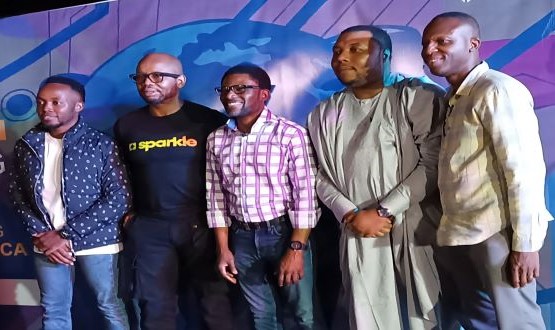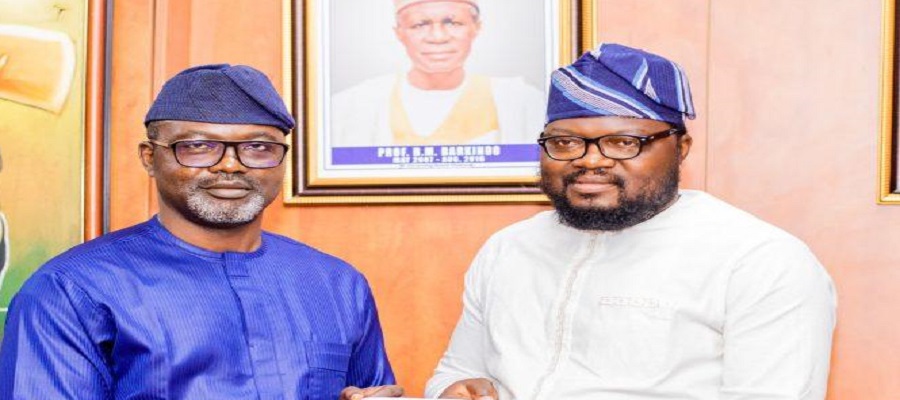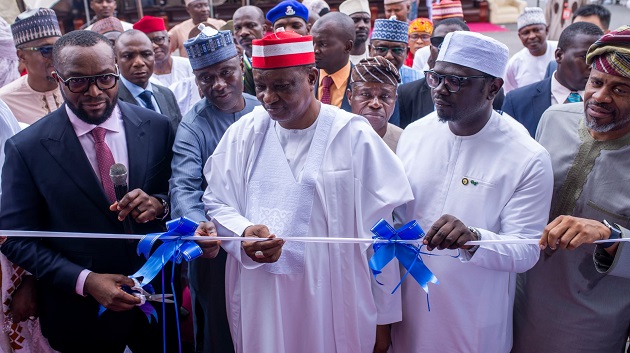News
Africa Fintech Foundry Unveils ‘The Big Tech Show’

Africa Fintech Foundry (AFF), an initiative that aims to nurture, fund, and accelerate the growth of Tech startups in Africa has launch a television show, ‘The Big Tech Show’.

The television documentary show launched in collaboration with Accelerate TV is aimed at exposing innovators and creating awareness on how African start-ups are using technology to solve problems.
Africa Fintech Foundry (AFF) is a pan-African initiative focused on creating new opportunities in Africa by providing a platform designed to inspire and challenge African innovators and entrepreneurs.
Speaking at the launch of the show in Lagos, Ade Bajomo, executive director of technology and operations, Access Bank, said that The Big Tech Show is basically to showcase the best that Africa have got. “We are building an ecosystem and that ecosystem is at the infancy stage as such we have to expose it.
“Show how innovators are throwing up the innovations, show how they are solving the problems. Now nerds rule the world because they are solving difficult problems. This is part of celebrating Africa and this programme goes around to Ghana, Kenya, South Africa and Nigeria,” he said.
According to him, “the role of AFF is basically to stay out there and look at the entire ecosystem across Nigeria and Africa as a whole and look for innovators across all fields and see how we can partner to develop solutions that can solve real deep problems.
“It can be for financial services, Agrictech, Insurtech or in solving social responsibility issue. It is about bringing that collaboration, that is why AFF is set up to find those Innovators, starts up, creative people fuse their ideas together and bring it back into the ecosystem.
“There are two things that changed the narrative in Nigeria, first one is Nollywood without support from anywhere became third in the world. The second is Afrobeat and the third one is developing and that is what we are doing here.
“The role of AFF is also to build that ecosystem, articulate all the issues in the ecosystem make them accessible, get more people to join the ecosystem and promote the ecosystem to fully develop so that Africa becomes the hub of digital innovation and for us to be solving our own problems in the fourth, fifth and six industrial revolution across the world”.
Uzoma Dozie, chief executive officer, Sparkle, described The Big Tech Show initiative as a very noble initiative. “What AFF is trying to do is to expo and create awareness of how many countries across Africa are trying to leverage on technology to make life better for their own people.
“Secondly, we need African organisations doing expose’ of what Africans are doing, you can’t expect Americans or Europeans to be doing it, let us take control of the narratives. That is exactly what The Big Tech Show is doing here. I think it is wonderful,” he stated.
On Impact of Fintech in Africa, Dozie said that Africa has not started in exploring Fintech. “They will always say that the biggest example of Fintech impact is in Nairobi with M-pesa. Where they used mobile money to effect change on how people transfer and changed their life.
“In Nigeria, we have seen that as well, but we haven’t talked about it enough. We need to do much more, Nigeria is a much bigger country with over 200 million people though with infrastructure challenges. We have education, health and Agriculture. These are areas where technology can play a role.
“From financial perspective Nigeria has done very well in FinTech, we have better mobile financial Apps than you can find in Europe but we need to use it to impact more life to go down on the pyramid. We are doing well, we have great creativity and entrepreneurship, we just need more collaboration between the private sector, regulators and legislatures for us to now build these skills. We need a common denominator. Right now, we are all working in silos.
“This kind of Big Tech Show would create that awareness among people in different stakeholder’s group. When you see what other countries are doing you ask yourself how come we are not doing this in Nigeria but we are actually investing in technology but how come it is not reaching the man on the street. What do we need to do? That might force us to come together to collaborate and find solution.
Iyinoluwa Aboyeji, cofounder, general partner – Future Africa, said that a lot of younger entrepreneurs need an encouragement and mentorship. “This show is going to help to inspire them so that they can see how people who did it before did it perhaps they will have an opportunity to follow in their steps.
“It is interesting that the bankers have decided to tell the stories of these entrepreneurs through collaboration between AFF and Accelerate TV,” he noted.
News
DBI, Miva Open University Partner to Advance Digital Innovation, Education

Digital Bridge Institute (DBI) and Miva Open University, Abuja, have signed a Memorandum of Understanding (MoU) to jointly promote digital technology and academic excellence in computer science and innovation.

Mr. David Daser, president/CEO, DBI, and Professor Tayo Arulogun, vice chancellor, Miva Open University.
DBI, a Federal Government-owned ICT training institute with headquarters in Abuja and campuses across Nigeria’s six geo-political zones, hosted the signing ceremony at its headquarters.
The MoU marks a significant step in formalizing and strengthening the existing relationship between the two institutions.
Signing on behalf of their institutions were
Speaking during the event, Mr. Daser praised Professor Arulogun’s leadership and commitment to academic development, which he said made the partnership possible. He emphasized that unlike many MoUs that remain inactive, this collaboration is set to deliver tangible results.
“We value this partnership and are confident it will meaningfully contribute to Nigeria’s education sector. DBI is fully prepared to implement the agreement and drive an impact across our campuses in Enugu, Abuja, Kano, Lagos, Asaba, and Yola,” Daser said.
He added that the collaboration would strengthen DBI’s National Innovation Diploma (NID) program and other initiatives through shared resources and new opportunities.
Professor Arulogun, in his remarks, highlighted the need for greater collaboration among Nigerian universities, criticizing the prevalent “do-it-alone syndrome.”
“Many institutions prefer to operate in silos, but collaboration is key. Pooling resources and working together will enhance capacity and academic output,” he stated. “With this partnership, we are ready to hit the ground running from student exchange to joint innovation projects like hackathons.”
He noted that hackathons provide platforms for discovering hidden talents and fostering innovation, and Miva is eager to integrate such activities into its academic programs.
Mr. Emeka Nzeih, head of Learning and Development, DBI, outlined the partnership’s key focus areas: student internships, real-world project collaborations, joint research in fields like AI, robotics, and cybersecurity, and shared access to DBI’s ICT labs and equipment for Miva’s students and faculty.
According to Nzeih, the initiative aims to enhance practical learning, foster innovation, and build capacity through collaborative training, research, and mentorship.
News
FIRS Commits to Fostering Trust, Voluntary Compliance Nationwide @ Tax Clinic

The Federal Inland Revenue Service (FIRS) has reaffirmed its commitment to fostering trust and voluntary tax compliance among small businesses, startups, and informal sector operators across the country.

This pledge comes ahead of the 2025 edition of its flagship outreach programme, the Tax Clinic, an initiative aimed at deepening tax education and strengthening compliance across Nigeria’s economic sectors.
Speaking in anticipation of the event, the Executive Chairman of FIRS, Dr Zacch Adedeji, emphasised that the clinic forms part of broader efforts to promote transparency, accountability, and inclusion in the tax system.
“The clinic reflects our commitment to promoting a culture of voluntary compliance by bringing tax education closer to the people. It is a critical step in strengthening trust, transparency, and inclusion in the tax system,” Dr Adedeji stated.
He noted the importance of expanding the country’s tax base and ensuring that citizens and business operators are empowered to fulfil their civic obligations.
“This clinic is more than an event; it’s a movement to ensure every Nigerian understands their role in nation-building through voluntary tax compliance,” he added.
Organised by the FIRS Emerging Taxpayers’ Group (ETG), the two-day event will feature expert-led sessions, panel discussions, interactive service desks, and live Q&A forums on issues such as tax filing, business registration, and dispute resolution.
Attendees will also have access to representatives from key institutions, including the Lagos State Internal Revenue Service (LIRS), Joint Tax Board (JTB), Corporate Affairs Commission (CAC), Tax Appeal Tribunal (TAT), National Identity Management Commission (NIMC), and Nigerian Investment Promotion Commission (NIPC).
Several professional bodies will also participate, including the Chartered Institute of Taxation of Nigeria (CITN), Institute of Chartered Accountants of Nigeria (ICAN), Association of National Accountants of Nigeria (ANAN), Nigerian Bar Association (NBA), and Nigerian Medical Association (NMA).
In addition to tax advisory services, the NMA will provide free basic medical screenings at the event. The first 300 participants to register physically will also receive branded gifts.
The clinic is open to business owners, self-employed individuals, trade groups, and professionals, with livestream options available for virtual participants.
With the theme ‘Tax Clinic for Tax Clarity’, the event is scheduled to take place on 15th and 16th July 2025 in Lagos.
FIRS says the initiative is central to its drive to boost revenue generation, integrate the informal economy, and streamline Nigeria’s tax architecture in line with its economic development agenda.
News
FG Commissions Rebuilt Kano Digital Industrial Park with Support from IHS Nigeria

The Federal Government has commissioned the fully refurbished and restored Kano Digital Industrial Park, reaffirming its commitment to inclusive digital growth, youth empowerment, and strong private sector collaboration.

The facility, which suffered significant damage during the August 2024 protests, has now been fully restored through a generous intervention by IHS Nigeria.
The commissioning ceremony, which took place on Wednesday, July 2, 2025, was led by the President of Nigeria, ably represented by the Honourable Minister of Communications, Innovation and Digital Economy, Dr. Bosun Tijani.
The event was graced by several dignitaries, including the Deputy Governor of Kano State (representing the Governor) Aminu Abdussalam Gwarzo; the Emir of Kano, represented by His Highness, Jarman Kano, Amb. Ahmed Umar OON; the Executive Vice Chairman/CEO of the Nigerian Communications Commission Dr Aminu Maida; the Minister of State for Youth Development; representatives from IHS Nigeria; and other senior government officials.
Delivering his opening remarks, the Executive Vice Chairman of the NCC, Dr. Aminu Maida, emphasized the strategic importance of the park and reaffirmed the Commission’s commitment to enabling Nigeria’s digital future.
“The recommissioning of the NCC Digital Industrial Park in Kano is a landmark moment in our journey to accelerate ICT innovation and empower the next generation of digital pioneers.
“This facility will serve as a catalyst for digital inclusion, economic transformation, and youth empowerment not just in Kano, but across the entire Northwest region. We remain committed to creating a thriving digital ecosystem where innovation can flourish and no one is left behind in Nigeria’s digital revolution.” He said.
Speaking on behalf of the Executive Governor of Kano State, the Deputy Governor, Comrade Aminu Abdussalam Gwarzo, reaffirmed the state’s digital ambition and expressed deep appreciation for the partnership that made the park’s restoration possible.
“This commissioning marks more than the unveiling of a refurbished structure, it represents Kano’s bold vision to lead Northern Nigeria’s digital transformation. “We are grateful to IHS Nigeria for their swift response and unwavering support following the vandalization of this facility. Their commitment goes beyond corporate responsibility, it reflects a shared vision for a digitally inclusive Nigeria. He said.
Also speaking at the commissioning ceremony, the Chief Operating Officer of IHS Nigeria, Kazeem Oladepo, who represented the CEO of IHS Nigeria, reaffirmed the company’s commitment to advancing Nigeria’s digital future.
“Our decision to sponsor the refurbishment of the Kano Digital Park is rooted in our commitment to supporting Nigeria’s digital economy and empowering young Nigerians with the skills to thrive in the digital age,” he said.
“This partnership with the Ministry of Communications, Innovation and Digital Economy is a clear demonstration of the power of public-private collaboration in addressing national challenges.
“We are proud to contribute to the 3MTT program and help restore this park as a hub of innovation and opportunity for the Kano community. Supporting initiatives like this and others such as the Ilorin Innovation Hub is how we aim to foster long-term digital growth, create jobs, and drive inclusive development across Nigeria.” He added.
Capping off the event, the Honourable Minister of Communications, Innovation and Digital Economy, Dr. Bosun Tijani, highlighted the significance of public-private collaboration in shaping Nigeria’s digital future.
“The recommissioning of the Kano Digital Industrial Park is a powerful demonstration of what is possible when public and private sector actors unite behind a shared vision. This facility is more than just infrastructure, it is a beacon of innovation, resilience, and opportunity for Northern Nigeria.
“IHS Nigeria’s swift intervention following the vandalism of this park reflects true partnership and corporate citizenship. Together, we are laying the foundation for a future where young Nigerians, especially those in underserved communities, have the tools and training to thrive in a digital economy.” He highlighted.
The Kano Digital Industrial Park forms a key part of the 3 Million Technical Talent (3MTT) initiative, a flagship government program aimed at equipping Nigerians with globally competitive digital skills.
The renovation includes fully equipped training labs, power and connectivity infrastructure, upgraded learning spaces, and restored digital equipment to support thousands of learners across Northern Nigeria.
The commissioning of the Kano Digital Industrial Park comes just weeks after Ilorin Innovation Hub, the largest innovation hub of its kind in West Africa, which is also sponsored by IHS Nigeria, kicked off its incubation and acceleration programs. These interventions highlight IHS Nigeria’s continued commitment to fostering innovation, creating jobs, and driving the growth of Nigeria’s digital economy.
By bringing the Kano Digital Industrial Park back on stream, IHS is reinforcing its pledge to support impactful initiatives at both the federal and sub-national levels, particularly those that provide opportunities for young Nigerians, who represent the future of the nation.

 Telecom3 days ago
Telecom3 days agoAVEVA Highlights Climate Impact Gains in 2024 Sustainability Report

 General News3 days ago
General News3 days agoAfCFTA Opens Opportunity for Logistics Sector

 Telecom3 days ago
Telecom3 days agoALTON Explains SIM-related Services Disruption Across Mobile Networks

 Telecom2 days ago
Telecom2 days agoNCC Approves MTN, 9Mobile Roaming Collaboration Deal

 E-Financial2 days ago
E-Financial2 days agoWorld Bank Approves Extra $65m for Nigeria’s SPESSE

 Telecom3 days ago
Telecom3 days agoMTN Foundation, NDLEA, UNODC Unite in Abuja Against Substance Abuse

 E-Financial2 days ago
E-Financial2 days agoEcobank Taps Google Cloud to Deepen Financial Inclusion

 E-Business2 days ago
E-Business2 days agoCAC Launches AI-powered Business Registration Portal
























